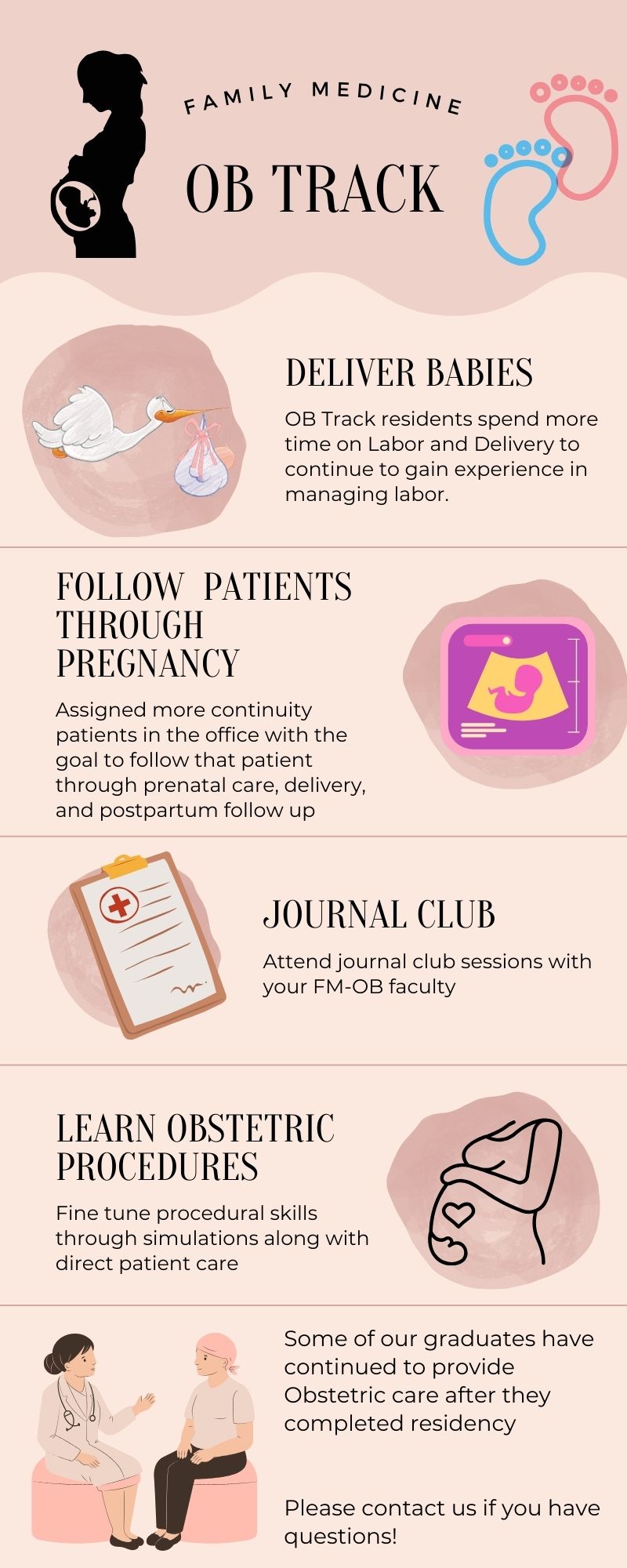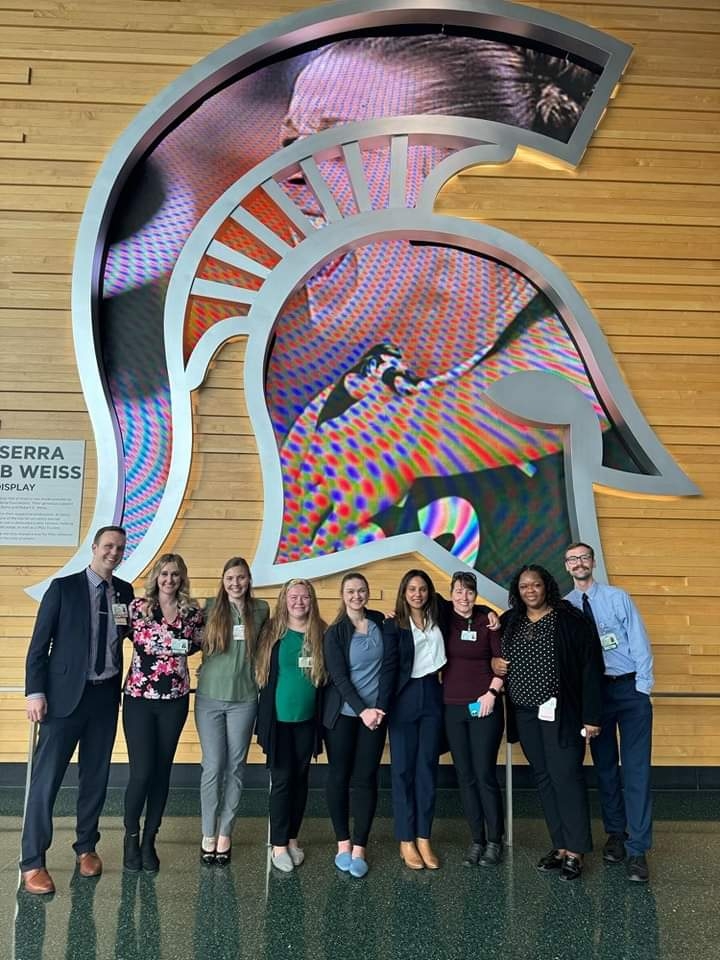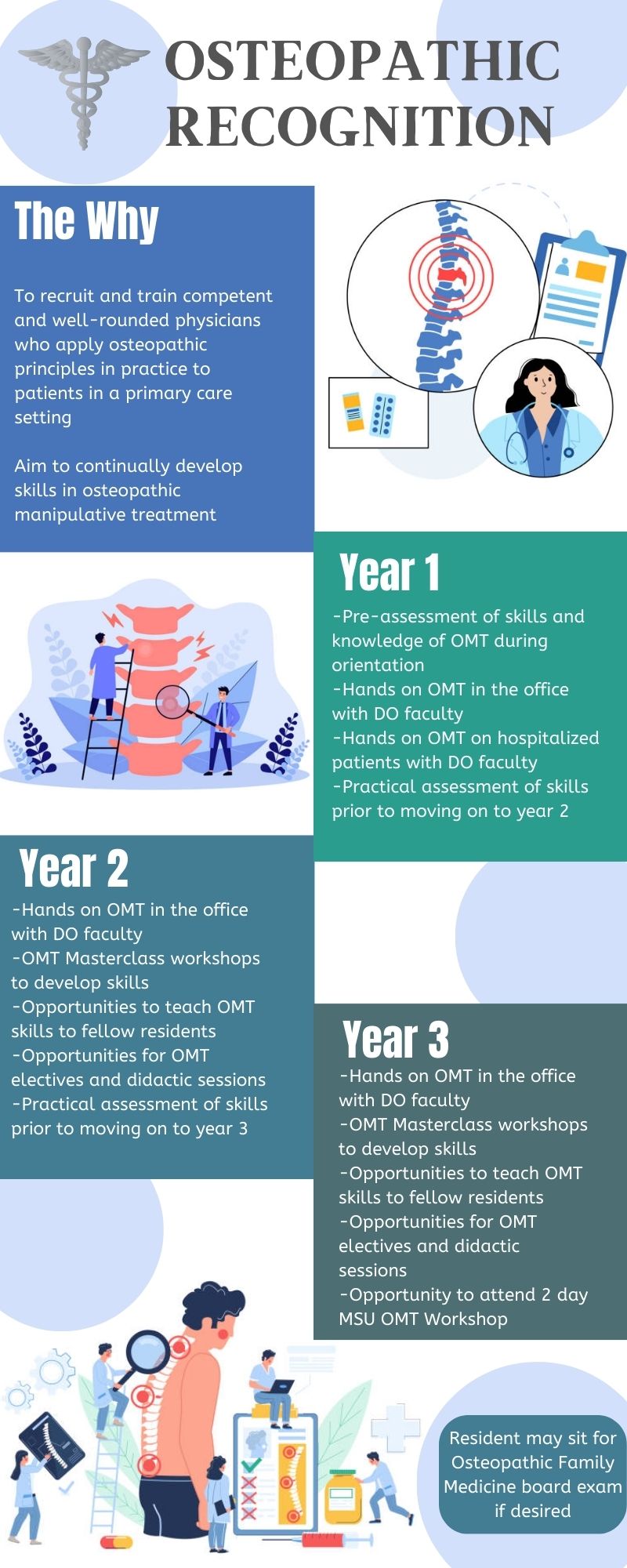Rotations
The University of Michigan-Sparrow/MSU Family Medicine Residency is 3 year program. The majority of hospital based rotations will take place at UMH Sparrow in Lansing. The program has two separate clinic sites for outpatient care, one in Lansing at the UMH Sparrow Professional building, and one in the more rural town of Mason. Residents will decide which clinic site they will have their continuity clinic at early in their first year.
-
PGY 1
-
- Orientation Month (mix of office and inpatient medicine)
- Behavioral Medicine
- Emergency Medicine
- Family Medicine Inpatient (3 months)
- OB-1 and OB-2
- ICU
- Nursery
- Inpatient Pediatrics
- Orthopedics
- Health Systems
-
PGY 2
-
- Ambulatory Pediatrics
- Cardiology
- Emergency Medicine-Eaton location
- Family Medicine Inpatient
- Office
- Geriatrics
- MSK: Podiatry, PM&R, Rheumatology, OMM
- Surgery- usually colorectal surgery
- Elective time
- OB Trackers: 2 weeks of OB night float
-
PGY 3
-
- Ambulatory Pediatrics
- Dermatology
- FM Inpatient
- Office
- Gynecoloy
- Pediatric Emergency Medicine
- Sports Medicine
- MSK: Podiatry, OMM, Rheumatology, PM&R
- Elective time
- OB Trackers: 2 weeks of OB night float
-
Examples of Elective Rotations
-
- Inpatient Electives
- Cardioloy
- Hospitalist/Internal Medicine
- OMM inpatient
- Neurology
- Psychiatry
- Academic Medicine with mix of inpatient and outpatient work
- Pediatric Subspecialties
- Outpatient peds in outside clinic
- Dermatology
- Endocrine
- Gastroenterology
- Hematology/Oncoloy
- Infectious Disease
- Lactation Medicine
- Neurology
- Orthopedics
- Pulmonology
- Outpatient options
- Addiction medicine
- Allergy
- Endocrinology
- Hematology/Oncology
- Hospice/Palliative care
- Nephrology
- Neurology
- OMM
- PM&R
- Psychiatry
- Research
- Rheumatology
- Sleep Medicine
- Urology
- Other options for individualized learning opportunities can be developed based on a resident's goals for the future
- Inpatient Electives
Advanced Maternity Care Track 
Training Sites
Sparrow Health System is now University of Michigan Health-Sparrow due to the recent partnership created with University of Michigan. Our sponsoring hospital here in Lansing, is a 733 bed, Level 1 Trauma Center.
Lansing Location
UMH Sparrow Professional Building
1200 E. Michigan Ave, Suite 245, Lansing, MI
Phone: (517) 364-5710
Fax: (517) 364-5717
Two thirds of our residents and faculty are based and have an assigned patient panel at Central. This site is in the capital city of Lansing and is about a mile from the capitol building. It is attached to UMH Sparrow Hospital via the Skywalk. Patients are mostly from the city and MSU.
Mason Location
Phone: (517) 244-8940
Fax: (517) 244-8941
One third of our residents and faculty are based and have an assigned patient panel in Mason. This site is about 20 minutes south of the main hospital. The patients come from the many farming communities around the area, the factories in town and many Adult Foster Care homes.

Didactics
A thorough and extensive didactics program is in place. Wednesday afternoons are protected time for family medicine residents to return from out rotations and participate in program specific didactics. These include a mixture of resident led and faculty led presentations, board review, journal clubs, and simulations using the hospital simulation lab.
There are also many other didactic times where residents learn communication skills, procedural skills, and work together on scholarly activity in small groups outside of Wednesday afternoon lectures.
Residents are encouraged to provide feedback and help create the didactic curriculum each year to cater to the needs of the group. Some residents even decide to be creative and present board review Jeopardy and Family Feud.

Scholarly Activity
Participation in scholarly activity during residency is a vital component to professional development. Research participation allows the resident to gain knowledge and experience of searching and critiquing the literature, usage of statistics, abstract and manuscript writing, and presenting their findings at local, regional, and national conferences. During this process, one will become educated in the ethics of scientific research and the role the IRB plays. Residents are mentored along beginning as a junior resident with increasing participation as they progress through their training.


